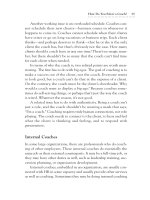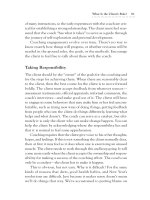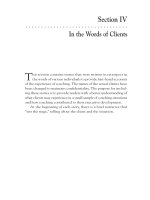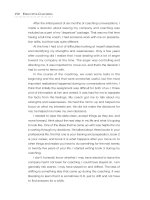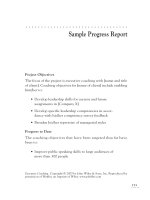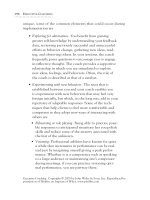Applied social research a tool for the human services 9th edition monette test bank
Bạn đang xem bản rút gọn của tài liệu. Xem và tải ngay bản đầy đủ của tài liệu tại đây (593.06 KB, 11 trang )
Monette/ Sullivan/ DeJong/Hilton, Applied Social Research: A Tool for the Human Services, 9e
Test Bank
Chapter 2: The Logic of Social Research
Multiple Choice
1. Which of the following would be true of science as a source of knowledge about the world?
a. It is a nearly infallible source of knowledge.
b. It has advantages that make it superior to other ways of gaining knowledge.
c. It is superior to traditional sources of knowledge but not to experience as a
source of knowledge.
d. If done properly, it has characteristics that make it resistant to change, even
when such change is called for.
ANS: B
PG: 20
2. A psychoanalyst accepts the teachings of Sigmund Freud without question, assuming that
such a great historical figure could not be wrong. This is an example of:
a.
b.
c.
d.
experiential knowledge.
scientific knowledge.
traditional knowledge.
practice knowledge.
ANS: C
PG: 21
3. One of the major disadvantages of traditional knowledge is:
a. it changes too rapidly, being easily influenced by fads and whims.
b. it tends to confuse knowledge with values.
c. there are some issues, relating to religion or personal values that tradition
cannot give us answers to.
d. all of the other answers represent disadvantages.
ANS: B
PG: 21
4. Experiential knowledge is based on:
a.
b.
c.
d.
firsthand, personal observations of events.
custom, habit, and repetition.
systematic observations of events.
acceptance of someone’s leadership and authority.
ANS: A
PG: 21
5. Which of the following is a limitation of experiential knowledge?
a. It is often based on a limited and biased range of observations.
b. Human perceptions are unreliable.
c. People in a position to experience something directly frequently have a vested
interest in perceiving that thing in a certain way.
d. All of the other answers represent limitations.
ANS: D
PG: 21-22
6. The adage “birds of a feather flock together” is used in the text as a way of illustrating which
source of knowledge?
a.
b.
c.
d.
common sense
experience
authority
tradition
ANS: A
PG: 22
7. One of the criticisms of common sense knowledge is that:
a.
b.
c.
d.
it is rarely accurate.
it is not based on experience.
it relies too heavily on experience and not on tradition.
it often explains everything, even when those explanations conflict with one
another.
ANS: D
PG: 22
8. Which of the following is a similarity between science and journalism as sources of
knowledge?
a.
b.
c.
d.
both use observation
both use replication
both use systematic procedures
both use authority
ANS: A
PG: 22
9. Which of the following are differences between science and journalism as sources of
knowledge?
a.
b.
c.
d.
Science uses observation but journalism does not.
Science is concerned with theory building but journalism is not.
Science is sometimes based on interviews but journalism never is.
All of the other answers represent differences.
ANS: B
PG: 23
10. Which of the following would be the most complete definition of "science" as a source of
knowledge?
a. It is the systematic observation of phenomena.
b. It is the systematic and objective study of the world.
c. It is a method of obtaining objective knowledge about the world through
systematic observation.
d. It is a method of obtaining objective knowledge of the world through the direct
experience of it.
ANS: C
PG: 23
11. Which of the following is NOT one of the distinguishing characteristics of science listed in
the text?
a.
b.
c.
d.
empirical
provisional
objectivity
evaluation
ANS: D
PG: 23-24
12. Which of the following is a reason for replication in science?
a.
b.
c.
d.
ANS: A
PG: 24
to reduce the chance of error or misinterpretation in research.
to test a common-sense theory about some phenomenon.
to move from the level of testing theories to that of testing hypotheses.
All of the other answers represent such reasons.
13. According to the text, scientific human service practice should have all of the following
EXCEPT:
a. it should stress problem assessment through direct observation of client
problems.
b. practice procedures should be well organized, clearly specified, public and
repeatable.
c. practice models and techniques should be viewed as fair game for criticism and
possible refutation.
d. practice approaches should be based on the practitioner's intuitive, common
sense assessment of the suitability of techniques.
ANS: D
PG: 25-26
14. According to the text, the unwanted intrusion of personal values into service delivery can be
controlled by all of the following EXCEPT:
a. removing all values from the delivery of human services.
b. using empirically-based practice approaches.
c. incorporating into practice some of the checks against bias that are a routine
part of scientific research.
d. conducting research into the role of values in service delivery.
ANS: A
PG: 25-26
15. A theory would be best defined as:
a. speculations that social scientists make regarding human behavior and social
phenomena.
b. a set of interrelated, abstract concepts and statements that offer an explanation
of some phenomenon.
c. assumptions that have been proven through research to be true.
d. concepts and statements that may be true but about which there is no
evidence.
ANS: B
PG: 26-27
16. One of the key things about theories is that they:
a.
b.
c.
d.
offer an abstract explanation of phenomena.
offer concrete descriptions of phenomena.
tell us what sort of research design to use.
offer an abstract explanation of phenomena, and tell us what sort of research
design to use.
ANS: A
PG: 28
17. In understanding the problems confronted by children of gays and lesbians, research in
Practice 2.1 argues that:
a. traditional teachings are the best source of knowledge.
b. experiential knowledge is generally superior to scientific knowledge.
c. journalistic knowledge provides the most detailed theoretical understanding of
problems.
d. scientific observation can point out where personal values unreasonably intrude
on intervention decisions.
ANS: D
PG: 27
18. The major difference between personal theories and scientific theories is that scientific
theories:
a.
b.
c.
d.
are not tentative.
are accurate interpretations of reality.
are based on casual observation.
are more precise, detailed, and explicit.
ANS: D
PG: 28
19. Theories serve as a guide for research in that:
a. you cannot conduct research without the direction of a theory.
b. theories focus research attention on certain phenomena as being relevant to
the issues of concern.
c. theories tell you what kind of research design would be most appropriate for a
given study.
d. theories tell you whether unwarranted biases have been introduced into the
research process.
ANS: B
PG: 29
20. In choosing among a number of intervention theories, a major consideration in the selection
of a theory to use is:
a.
b.
c.
d.
how well known the theorist is.
how easy it is to learn to apply the theory.
how much empirical evidence supports the theory.
how abstract the theory is.
ANS: C
PG: 30
21. In the process of theory verification in research, _______________ is analogous to
_______________ in the process of theory verification in practice.
a.
b.
c.
d.
research findings...theory
theory...intervention plan
intervention plan...observations
observation...intervention
ANS: D
PG: 30
22. Which of the following would be most clearly a nominal definition of poverty?
a. an annual income of less than $10,000.
b. a deficiency of resources to the extent that one can't obtain a minimally
acceptable lifestyle.
c. an annual income that is less than one half of the median family income.
d. all people who are receiving some form of public assistance.
ANS: B
PG: 31
23. A “negative” relationship is the same thing as a/an:
a.
b.
c.
d.
linear relationship.
curvilinear relationship.
inverse relationship.
nominal relationship.
ANS: C
PG: 32
24. Which of the following statements indicates a positive relationship between the variables X
and Y?
a.
b.
c.
d.
As the value of X increases, the value of Y decreases.
As the value of Y increases, the value of X decreases.
As the value of X increases, the value of Y remains unchanged.
As the value of X decreases, the value of Y decreases.
ANS: D
PG: 32
25. Why is careful operational definition a critical issue in terms of minority groups and
disadvantaged populations?
a. Inappropriate operational definition can lead to a biased, distorted view of a
minority group.
b. Use of official designations such as "cleared by arrest" tends to under-represent
minorities in crime statistics.
c. Because nominal definitions of minority groups are racist.
d. None of these answers is correct.
ANS: A
PG: 33-34
26. When scientific analysis moves from the level of theoretical statements to that of testable
hypotheses, the process has involved:
a.
b.
c.
d.
inductive reasoning.
deductive reasoning.
common sense reasoning.
operational definitions.
ANS: B
PG: 34
27. Which of the following is true regarding reasoning in scientific research?
a. Inductive research is sometimes conducted without the benefit of prior
deductive reasoning.
b. Inductive reasoning and deductive reasoning are always used together.
c. In deriving hypotheses from theories, inductive reasoning is used.
d. In the absence of theory, neither inductive nor deductive reasoning can be used.
ANS: A
PG: 35
28. Reasoning that involves inferring a specific conclusion from some general or abstract
premises is called:
a.
b.
c.
d.
ANS: D
PG: 34-35
inductive reasoning.
nomothetic reasoning.
idiographic reasoning.
deductive reasoning.
29. A(n)
explanation focuses on a class of events and attempts to specify the
conditions that seem common to all those events.
a.
b.
c.
d.
idiographic
nomothetic
deductive
interpretive
ANS: B
PG: 35, 37
30. Which of the following statements most clearly represents an effort at a nomothetic
explanation?
a. a study attempting to show whether all juveniles who shoplift have a weak
attachment to their parents.
b. a case study of the life of one juvenile who shoplifts.
c. a study attempting to identify all of the factors that influenced one individual to
shoplift.
d. a study that seeks a complete description of the social circumstances of a single
shoplifter.
ANS: A
PG: 35, 37
31. Which of the following is stated in the text as a weakness of nomothetic explanations?
a.
b.
c.
d.
They have limited generalizability.
They don’t let you say for sure what will happen in any particular case.
They focus too heavily on individual cases.
They cannot be subjected to statistical analysis.
ANS: B
PG: 37
32. 32. A/an
explanation focuses on a single person, event, or situation and
attempts to specify all the conditions that helped produce it.
a.
b.
c.
d.
idiographic
nomothetic
deductive
interpretive
ANS: A
PG: 37
33. Regarding nomothetic and idiographic explanations in science, the text concludes that:
a. idiographic explanations are outdated.
b. nomothetic explanations are better at identifying the totality of causes at work
in a situation.
c. both are equally useful for generalizing to large populations.
d. neither is inherently better than the other and each provides a valuable, though
incomplete, route to gaining knowledge.
ANS: D
PG: 37-38
34. In the study of burnout among human service workers, theories of organizational structure
and change identify which of the following variables as causing burnout?
a.
b.
c.
d.
insufficient emotional strength of social workers
bureaucratization in human service organizations
centralization in human service organizations
bureaucratization and centralization in human service organizations
ANS: D
PG: 36
35. When social work researcher W. David Harrison explained burnout among social workers on
the basis of role theory, he was using:
a.
b.
c.
d.
inductive reasoning.
deductive reasoning.
common sense reasoning.
experiential knowledge.
ANS: B
PG: 36
36. Which of the following statements would be most clearly consistent with the positivist
approach to science?
a. social reality is subjective and arises out of social meaning created through
social interaction
b. science is a vehicle that scientists use to gain power, respect, and legitimacy in
society
c. verstehen is the most legitimate way of gaining knowledge about the world
d. science uses objective techniques to discover a world that exists independently
of the scientists’ perceptions if it
ANS: D
PG: 39
37. Which of the following is the paradigm that is most widely held among scientists?
a.
b.
c.
d.
positivism
the interpretive approach
the feminist approach
the verstehen approach
ANS: A
PG: 39
38. The interpretive paradigm in the social sciences would be most clearly consistent with which
statement?
a.
b.
c.
d.
scientists merely discover what exists in the world
true understanding is gained through abstract explanation
scientists help to create social reality through their scientific work
structures of oppression exist objectively, even if people don’t recognize their
existence
ANS: C
PG: 41
39. To infer causality, all of the following must be present EXCEPT:
a.
b.
c.
d.
there must be a statistical association between two variables.
one variable must occur prior in time to the other variable.
there must be a positive relationship between the two variables.
all of the other answers state factors that must be present.
ANS: C
PG: 42
40. A spurious relationship is one in which:
a. there is a positive relationship between two variables.
b. the relationship between two variables disappears when the effects of other
variables are taken into account.
c. the independent variable occurs later in time than does the dependent variable.
d. inductive reasoning is used but not deductive reasoning.
ANS: B
PG: 42
Essay Questions
1. Why is science a superior source of knowledge compared to tradition, experience, or
common sense?
2. Compare and contrast journalism and science as ways of gaining knowledge about the
world. How are they similar to one another and how are they different?
3. The text presents five characteristics of science that set it apart from other sources of
knowledge. Identify and describe those characteristics.
4. Discuss the five characteristics of science as they might be applied to human service
practice.
5. Discuss the functions of theories in conducting social research.
6. The text provides guidelines for developing hypotheses. Identify and discuss these
guidelines.
7. Differentiate between deductive reasoning and inductive reasoning. What is the role of
each in the scientific process?
8. Define and describe nomothetic and idiographic explanation. What are the strengths and
weaknesses of each?
9. Compare and contrast the positivist and nonpositivist paradigms in science.
10. What three conditions must be established in order to have demonstrated the existence of
a causal relationship between two variables? Explain what each condition involves.


